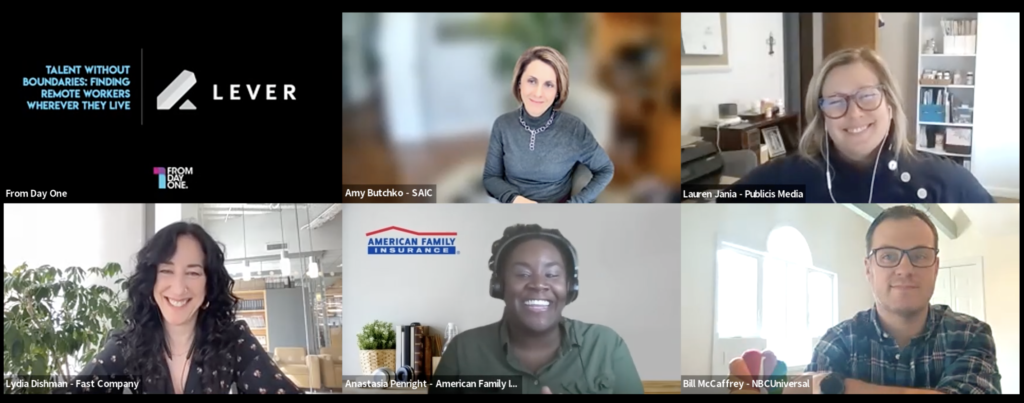Talent Unlimited: Finding Remote Workers Wherever They Live


To understand the dramatic impact of remote work, look no further than the data: 41% of U.S. employees worked from home during the height of the pandemic, with nearly 27% staying home through last year. A fall 2021 report from Upwork predicts the number of remote workers will almost double in the next five years to 36.2 million Americans, a massive uptick from the 19.4 million people working remotely before the pandemic.
Remote and hybrid work is here to stay and companies have begun creating best practices for that reality. In a From Day One webinar, Talent Without Boundaries: Finding Remote Workers Wherever They Live, experts in talent acquisition talked about the logistics of remote work as well as larger questions around company culture, retention, and investments in diversity, equity, and inclusion (DEI).
Each panelist’s company had approached remote work differently, but all are taking advantage of remote work to expand talent pools. “We were primarily New York- and Chicago-based,” said Lauren Jania, director of talent acquisition for Publicis Media. “It was about really understanding, especially for roles that are not client-facing, why there was such a need for them being in an office. And it really did open up the doors to hiring out of Texas and Florida, where we didn’t have much of a presence at all.”
The shift has required new strategies in communication and recruitment. “At any given time, we have around 2,000 positions open and 473 of them are listed with remote options,” said Amy Butchko, the talent-acquisition solutions director for the tech-driven government contractor SAIC. “We are still trying to figure out how to communicate what’s on site, what’s remote, what’s in-between, and how to engage with job seekers who are looking for any of those options.”
At American Family Insurance, where most of the employees are working remotely, this configuration aligned with the company’s investment in DEI. “It became a no. 1 priority of how we’ll do this quickly,” explained Anastasia Penright, the company’s diversity recruiting strategist. “We’ve really seen success and it’s changed the way we sell the opportunity.”
At Publicis Media, they’ve found success through virtual career fairs and the annual “Multicultural Talent Pipeline” event. “That exploded since we took it virtual,” Jania said.

William McCaffrey, the manager of talent acquisition for technology and operations at NBCUniversal, said he has worked closely with branding and marketing to help drive job opportunities into new markets. Another partner has been the legal team, so “legally we could understand how to go about doing this, the different messaging depending on the states and the bylaws.”
Moderator Lydia Dishman, a staff editor at Fast Company, asked panelists to discuss “something that’s rather polarizing among leaders of companies—compensation.” Should the home base of an employee affect how much they get paid?
At NBCUniversal, based New York City, “We’re really hiring for the right individual. We’re looking at other members of the team, what they’re making, and we want to hire within that range.” McCaffrey said. “It’s more than just a dollar–we’re really selling the culture.”
“SAIC is constantly evaluating salary surveys,” said Butchko, who noted that the company works in all 50 states. “And what we’ve begun to do is take real-time data about what candidates are being paid and what they’re asking for in the market.”
When the topic turned to the interview process, panelists spoke to shifting the experience to make it short and seamless for both parties. “From a talent-attraction perspective, we try to keep the interview process as short as possible,” said Butchko. “But you don’t necessarily want to cut corners, just to make it go faster, because ultimately it’s about finding a good match.”
Penright spoke to American Family Insurance’s new approach to panel interviews. “We encourage, wherever possible, to have a diverse panel of interviewers, so when we’re evaluating that candidate we are coming from so many different perspectives.”
McCaffrey spoke to assigning managers different roles when conducting interviews: “During debriefs, everybody owns a portion of that interview process,” like assessing skill sets. “Ultimately doing that in the virtual environment has been something we’ve learned to move forward with.” NBC also uses a third-party platform that provides questions to help assess a candidate’s soft skills.
Panelists were in agreement that remote work has offered exciting new opportunities for recruitment and building more diverse companies. “At the end of the day,” McCaffrey said, “We’re trying to cast the largest net and ultimately give candidates a great candidate experience.”
Editor's Note: From Day One thanks our partner who sponsored this webinar, the recruiting-software company Lever.
Emily Nonko is a Brooklyn, NY-based reporter who writes about real estate, architecture, urbanism and design. Her work has appeared in the Wall Street Journal, New York magazine, Curbed and other publications.
The From Day One Newsletter is a monthly roundup of articles, features, and editorials on innovative ways for companies to forge stronger relationships with their employees, customers, and communities.